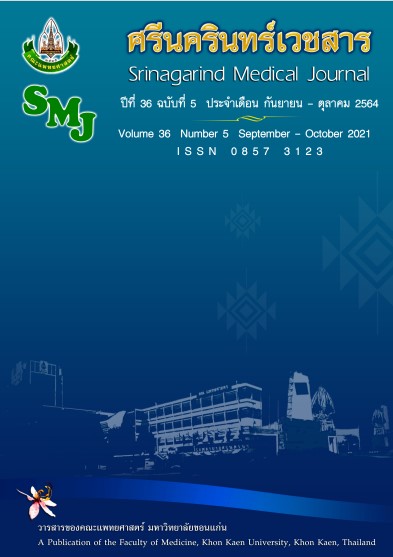ความรู้ ทัศนคติ และพฤติกรรมการป้องกันโควิด 19 ของประชาชนในตำบลปรุใหญ่ อำเภอเมือง จังหวัดนครราชสีมา
Abstract
Knowledge, Attitudes, and Preventive Behaviors of COVID-19 among Residents in Pru Yai Sub-district, Muang District, Nakhon Ratchasima Province
Daranchanok Phansuma1, Pongsit Boonruksa2*
1 Surawiwat School, Suranaree University of Technology
2 School of Occupational Health and Safety, Institute of Public Health, Suranaree University of Technology
*Corresponding Author: Pongsit Boonruksa, School of Occupational Health and Safety, Institute of Public Health, Suranaree University of Technology, E-mail: pongsitb@sut.ac.th
หลักการและวัตถุประสงค์: การระบาดของโควิด 19 ส่งผลกระทบต่อชีวิต สุขภาพ และเศรษฐกิจทั่วโลกรวมทั้งประเทศไทย การศึกษานี้มีวัตถุประสงค์เพื่อศึกษาความรู้ ทัศนคติ และพฤติกรรมการป้องกันโควิด 19 และปัจจัยที่มีผลต่อระดับความรู้ ทัศนคติ และพฤติกรรมการป้องกันโควิด 19 ของประชาชนในตำบลปรุใหญ่ อำเภอเมือง จังหวัดนครราชสีมา
วิธีการศึกษา: เป็นการศึกษาเชิงพรรณนาแบบภาคตัดขวางในกลุ่มตัวอย่าง 348 ราย เก็บรวบรวมข้อมูลโดยใช้แบบสอบถาม ประกอบด้วยข้อมูลส่วนบุคคล แบบสอบถามความรู้ ทัศนคติ และพฤติกรรมการป้องกันโควิด 19 วิเคราะห์ข้อมูลด้วยสถิติเชิงพรรณนา สัมประสิทธิ์สหสัมพันธ์ของสเปียร์แมน และสถิติไคสแควร์
ผลการศึกษา: กลุ่มตัวอย่างมีคะแนนเฉลี่ยของความรู้อยู่ในระดับปานกลาง ทัศนคติและพฤติกรรมการป้องกันโควิด 19 อยู่ในระดับดี กลุ่มตัวอย่างมีความรู้ ทัศนคติ และพฤติกรรมอยู่ในระดับดี คิดเป็นร้อยละ62.4, 71.3 และ 72.4 ตามลำดับ พบความสัมพันธ์อย่างมีนัยสัมพันธ์ทางสถิติระหว่างความรู้กับทัศนคติ (rs= 0.49) ความรู้กับพฤติกรรม (rs = 0.47) และทัศนคติกับพฤติกรรม (rs = 0.79) ปัจจัยที่มีความสัมพันธ์กับระดับความรู้ ทัศนคติ และพฤติกรรมการป้องกันโควิด 19 ได้แก่ อายุ ระดับการศึกษา รายได้ และช่องทางการรับข้อมูลโควิด 19 ผ่านอินเตอร์เน็ต/สื่อสังคมออนไลน์
สรุป: ความรู้และทัศนคติมีความสัมพันธ์กับพฤติกรรมการป้องกันโควิด 19 ปัจจัยส่วนบุคคลมีความสัมพันธ์กับระดับความรู้ ทัศนคติ และพฤติกรรม ข้อมูลนี้สามารถใช้เป็นแนวทางในการป้องกันและควบคุมการแพร่ระบาดของโควิด 19 ในชุมชนให้มีประสิทธิภาพมากยิ่งขึ้น
คำสำคัญ: โควิด 19; ความรู้; ทัศนคติ; พฤติกรรมการป้องกัน; ชุมชน
Background and Objectives: The COVID-19 pandemic causes deaths, health effects, and economic impacts across the world including Thailand. This study aimed to identify knowledge, attitudes, and preventive behaviors of COVID-19 and their factors among residents in Pru Yai Sub-district, Muang District, Nakhon Ratchasima province.
Methods: A cross-sectional descriptive study was conducted in 348 samples. Data were collected using a questionnaire. It consisted of personal informations, and a set of questions to assess COVID-19 knowledge, attitudes, and preventive behaviors. The data were analyzed using descriptive statistics, Spearman correlation, and Chi-square test.
Results: The average score of knowledge was moderate, whereas those of attitudes and preventive behaviors were good. Most subjects had a good level of knowledge (62.4%), attitudes (71.3%), and preventive behaviors of COVID-19 (72.4%). Knowledge was positive correlated with attitude (rs= 0.49) and with preventive behavior (rs = 0.47). Attitude had a positive correlation with preventive behavior (rs = 0.79). Factors related to the level of knowledge, attitude, and preventive behavior were age, education level, income, and source of COVID-19 information via the internet/social media platform.
Conclusions: Knowledge and attitudes had relationships with preventive behaviors of COVID-19. The level of the knowledge, attitudes, and behaviors were related to personal characteristics. The data could be used as guidelines for efficient COVID-19 pandemic prevention and control in the communities.
Keywords: COVID-19; knowledge; attitude; preventive behavior; community


